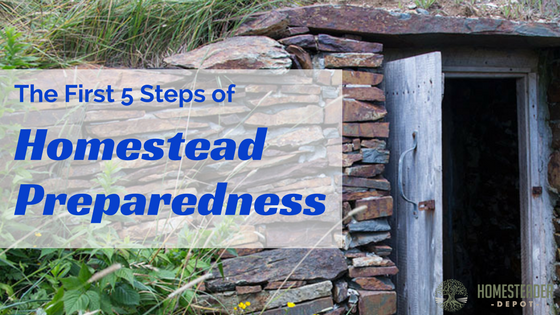A huge part of the reason one might be compelled to homestead, either on your own property or even in a city or suburb, is to be more self-reliant in case of disaster.
But if you’re just a hobby farmer or an urban dweller who wants to prepare for emergencies, what do you need to get started?
Here are a few tips to build a survival stash and plan to keep your family safe when disaster strikes.
1. Be Sensible
Survivalism is pretty popular these days, and there’s a huge mix of reasonable admonition to prepare and hysterical doomsday hype. First of all, just get your head on straight and think about what is realistic to prepare for. Natural disasters are inevitable, war isn’t entirely unreasonable, threats to our cyber security systems and electrical grids are absolutely realistic (alien invasions and widespread holographic mind control, not so much, although you never know!).
2. Start small
It’s typically advised to have enough clean drinking water and non-perishable food in your household to last each member of your family 48 hours, along with blankets, medical supplies, flashlights and/or candles, and spare cash. While this won’t sustain you very long in a large-scale disaster, it’s a great place to get started.
3. Set goals
When building an actual survival stash that would sustain you for several months and even years, set some goals for yourself. Budget to spend a certain amount of money on survival food and supplies a month, for example, or perhaps plan to save up enough to build a storm shelter for next year. Figure out what it is exactly that you want to make sure to have in the case of a disaster, and set reasonable, realistic goals for how to work towards that.
4. Aim for reliance
Homesteaders and aspiring homesteaders know more than anyone that the goal should be sustainable reliance more than simply stockpiling essentials. Invest in livestock and start a garden, learn about edible foods in your area and spend some time learning basic first aid and herbal medicine, learn to build and fix things, and start planning your life around a world that’s no longer reliant on a modern grid.
You never know when disaster could strike, and you will never be fully prepared. But that doesn’t mean there aren’t common sense basics you can start with now to help ease the blow when it happens.
If you enjoyed this, you might also like….
Can You Defend Your Family When SHTF?
Natural Healing Secrets You Need to Know…
Effective Primal Diet Hacks…


